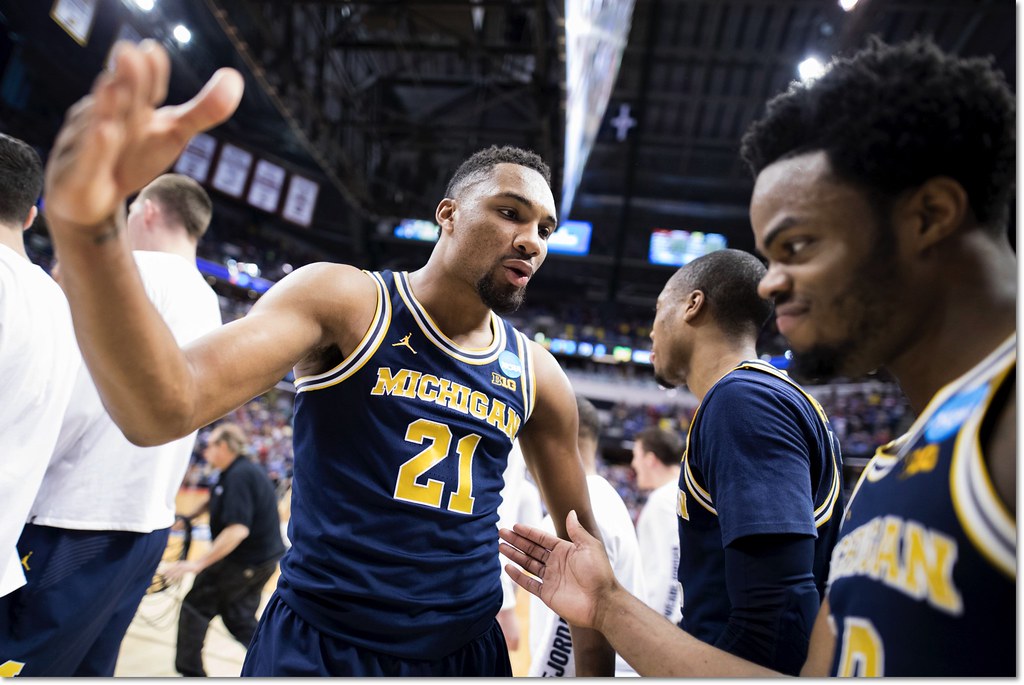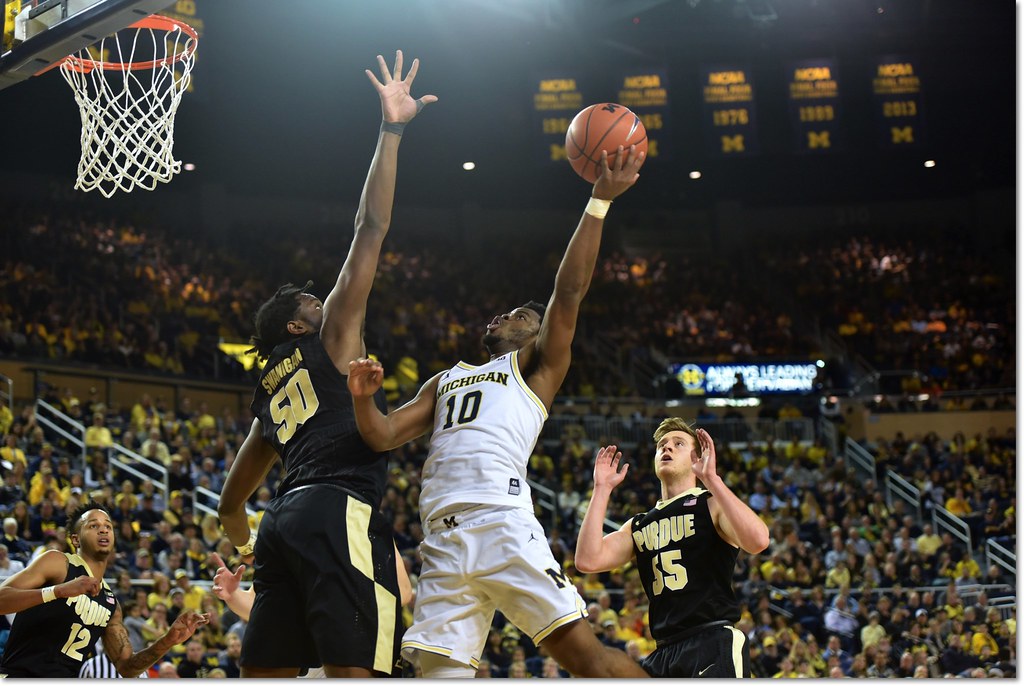
This was a good year for seniors. [Marc-Gregor Campredon]
Previously: All-Bench, Bench Mob, All-Freshman
John Beilein has spent ten seasons in Ann Arbor. As of the most recent, he's the winningest coach in program history with 215. He snapped Michigan's post-sanction tournament drought in 2009, the first of seven NCAA appearances with the Wolverines, three of which have extended at least into the second weekend.
In recognition of the above, as well as the need for offseason #content, I've put together a series of All-Beilein teams, inspired by this twitter post and the ensuing conversation. My guidelines:
- I'm attempting to put together the best possible lineups, which isn't necessarily the same as picking the best individual players at each spot.
- I'm choosing individual player vintages (i.e. 2013 Trey Burke). A player can only be chosen once for each category, but different player years (i.e. freshman bench gunner 2014 Zak Irvin and well-rounded senior 2017 Zak Irvin) can be eligible for separate categories.
- The same player/year can be chosen for multiple categories—for instance, 2013 Mitch McGary making the All-Bench team doesn't exclude him from making the final All-Beilein team.
Eligibility for certain categories may be slightly fudged because of the limited pool of players.
I'm not putting too many constraints on myself for this exercise since the point is to let our imaginations run wild. Today's list is the logical counterpart to the previous All-Freshman squad: here are the best senior seasons from Beilein's players. Could I fill out a full second team? Well, no. No I couldn't.
POINT GUARD: 2016-17 DERRICK WALTON

It all came together for Walton in his final season. [Bryan Fuller]
Might I recommend the 5000-word version of this blurb? For those who don't have time, a relevant sampling:
Walton had spent his time at Michigan as the consummate teammate, always looking to get his talented teammates going before seeking his own shot. At the same time he called upon his team to step up and make plays, he embraced calling his own number.
"He’s really become the guard that he always wanted to be and we always wanted him to be. It’s not that he’s been bad in between. It’s just that he’s such a great, unselfish player who’s always about the team. I think he convinced himself that if it’s really about the team, then I need to do more." — John Beilein
The swaggering star of Chandler Park Academy and the blacktops of Detroit was reborn in maize and blue. This Walton fought through contact for and-one buckets. He made inch-perfect assists, whether hitting a slipping big man in stride, two-handing a 35-foot bounce pass, or launching an 80-foot outlet over the top. He hit pull-up threes over rubber-kneed defenders and let them hear all about it on the way back down the court.
After a promising freshman season was followed by an injury-plagued sophomore year and underwhelming junior campaign, Walton transformed as a senior into the best Michigan point guard to play for Beilein, Trey Burke excepted—and Walton was so good down the stretch that you could almost (almost) eliminate that caveat. I could watch this all day:
The early NBA departures of Burke and Darius Morris didn't leave much in the way of competition for this spot. That doesn't make Walton's senior year any less spectacular.
[Hit THE JUMP for the rest of the lineup.]
WING: 2015-16 CARIS LEVERT

Before injury struck, LeVert was a legitimate superstar. [Fuller]
I know, I know. Caris LeVert played only 14 games as a senior, one of which was a depressingly short stint testing his injured foot against Purdue before shutting it down for good.
For those 14 games, though, LeVert played at a national player of the year level. The KenPom numbers are mind-boggling, even when accounting for non-conference competition:

LeVert did everything for the offense: he finished at the rim, drew fouls, provided dead-eye three-point shooting, and distributed the ball like a top-tier point guard. Add in his center-like defensive rebounding and he was a consistent triple-double threat. His final full game in a Michigan uniform: 22 points, 6/10 on twos, 3/6 on threes, five rebounds, and ten assists in a ten-point win over Illinois in the conference opener.
The year since LeVert's departure has further confirmed that his 2015-16 season was going to be special. Despite a history of foot injuries, he was drafted with the 20th pick and averaged 8.2 points in 22 minutes per game for the Brooklyn Nets. I strongly considered Stu Douglass for this spot since he was a solid player over a full season, but I can't shake how good LeVert was, even if his senior year was abbreviated.
WING: 2016-17 ZAK IRVIN

Irvin's defense kept him valuable during his offensive slumps. [Campredon]
If Zak Irvin's senior campaign had ended before the postseason, he probably doesn't make this list. While his ability to ably guard multiple positions was one of the keys to Michigan's midseason defensive turnaround, his offense abandoned him for disturbingly long stretches. He still scattered some good performances in there, however, and then came up huge when the games counted the most:
To his considerable credit, Irvin took a back seat to Derrick Walton and the Wagner/Wilson frontcourt, using fewer possessions than ever before. He eliminated the dreaded "heroball" shots from his arsenal. (Mostly, at least. Shooter's gonna shoot.) In doing so, he completed his transformation from gunner to glue guy. As Michigan surged down the stretch, Irvin rarely came off the court. He did a bit of everything: defending, rebounding, deferring, whatever the team needed at that particular moment. Scoring, too. His shot returned.
Over the final nine games of his career, Irvin averaged 14.7 points, 5.0 rebounds, and 2.5 assists in 37.4 minutes. He shot 65% on two-pointers, many of them his pet midrange pull-up, and 43% on three-pointers. Michigan went 7-2; both losses came down to the final possession.
Irvin, like Walton, went out with guns blazing, scoring 19 points while limiting Oregon's best player, Dillon Brooks, to an inefficient 12 in his final game. It's hard to overstate how much more complete he was as a player when he left Michigan than when he arrived. He even made us briefly stop hating long twos. That alone is enough of an accomplishment to merit inclusion here.
STRETCH FOUR: 2009-10 DESHAWN SIMS

While Peedi's Michigan career ended with a thud as the Wolverines never clicked in a 15-17 season, he still had a strong year, enough so that I've slid him down to the four to get the best five-man lineup possible here. It's not a perfect fit, but Sims was at least a plausible outside shooting threat—his 28% mark on threes as a senior was a couple ticks below his career average.
He did everything else well, especially considering the environment: a lot of M's possessions that year ended with Sims having to create his own shot out of nothing. He made 53% of his twos on a high volume of shots, was a solid passer who rarely turned it over, rebounded well on both ends of the floor, and played disruptive defense with rim protection that would play better at the four than the five.
At 6'8", 235, he's a much better fit for the position than the other candidate here. While Zack Novak got strong consideration, I couldn't justifying putting a 6'4" role player—no matter how gritty—over a larger player who was one of his team's top two scoring options. It's not Sims' fault that he was playing on a team that played a sophomore Laval Lucas-Perry for over half of the available minutes.
CENTER: 2013-14 JORDAN MORGAN

Grown-ass man. [Fuller]
After the 2013 Final Four run, it looked for all the world like Jordan Morgan, as serviceable as he had been for three years as the starting center, would finish his career as a bench player. Mitch McGary's back injury gave Morgan another shot, however, and he took full advantage.
Morgan made 70% of his field goals, a big step up from an already impressive career mark after working hard to become a better finisher off the pick-and-roll. He finished top ten in the Big Ten in both offensive and defensive rebounding. While his excellent defense mostly stemmed from smart positional play, he blocked shots at a higher rate than ever before.
When Morgan badly rolled his ankle in the penultimate Big Ten regular season game against Illinois, it looked like the rest of his season could be in jeopardy. Instead, he had one of his best games in the finale against Indiana, scoring 15 points on 7-for-8 shooting and grabbing ten boards (five offensive) to help Michigan lock up the Big Ten championship.

He cemented his legacy with consecutive great F-you games in the tournament against Texas and Tennessee:
The bout between the two was painted as a Tennessee advantage.
That paint turned out to be blue, not orange.
So walking off the floor, Morgan yelled one word into the airy, 65,000-seat stadium.
“Mismatch!”
Not only did Morgan drop 15 points and pull down seven rebounds on Friday night; he held Stokes to 11 points and six rebounds. The UT junior entered the night averaging 20 points and 15 rebounds in the Vols’ three previous NCAA tournament wins.
Michigan's run ended in the Elite Eight against an enormous Kentucky squad; Morgan played admirably in that game, too, but couldn't get any help on the boards, and the team was overwhelmed when foul trouble forced him to the bench. Even the final loss showed just how integral he'd become to the team's success. When he lost his job, Morgan didn't get salty; he got motivated. That paid off handsomely when his senior season took an unexpected turn.
HONORABLE MENTIONS: '09 CJ LEE, '12 STU DOUGLASS, '12 ZACK NOVAK
Putting together this list really drove home how little senior talent John Beilein has been able to work with during his Michigan tenure, mostly due to early NBA draft departures. CJ Lee was a walk-on who started at point guard over fellow walk-on David Merritt and Kelvin Grady, who'd decide to move over to the football team the following season. Zack and Stu were integral parts of Beilein's first three tournament teams and beloved around here for good reason; they were also role players who finished their careers as the third and fourth options behind Tim Hardaway Jr. and Trey Burke. I didn't bother adding two more players to fill out the honorable mentions because I'd have to include the likes of Jevohn Shepherd.
THE CHEMISTRY
The All-Senior squad fits together pretty darn well. Walton and LeVert would have great pick-and-roll chemistry with Jordan Morgan and give the team two players who can reliably create their own shots. Irvin and Sims add two more late-clock options, as well as great size and versatility on defense. While they couldn't go five-out on offense like this past Michigan team, they'd make up for it with superior defense. An All-Senior vs. All-Freshman matchup would be more competitive than it looks at first glance, though I'd still go with the young guns.